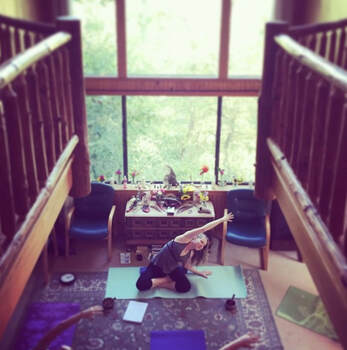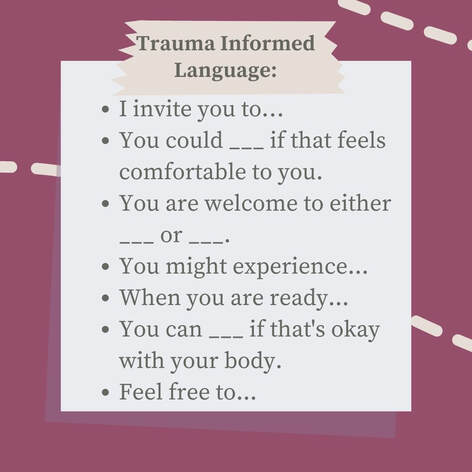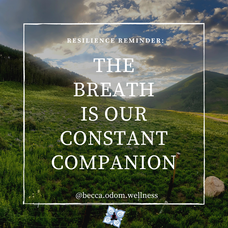 We live in a chronically overstimulated world. For many of us, it is important to focus on creating time to decompress from the day in order to avoid burnout. Often many of us are so exhausted by the end of the day, we will just collapse. If we can take a few moments to consciously decompress, we allow our nervous system a chance to complete the stress cycle and reset. Some decompression practices include:
Not allowing the nervous system time to decompress would be the same as eating nonstop every day - our bodies wouldn’t have time to effectively filter out toxins vs. nutrients. These decompression practices can happen during transitions throughout the day or as a conscious way to unwind in the evening. Whatever you choose, start small. Try to do something for just 2 minutes a day. Every week, add slowly to those practices and over time it will make a big impact on our stress and resilience. For more trauma tips and tools, join my newsletter for free weekly resources by clicking here! My Ethics of Trauma Informed Care virtual training is Friday, April 29th from 9-11 EST. Participants have lifetime access to the recording so you do not have to attend live to receive the 2 Ethics CEs! For more information and to reserve your spot, click here.
0 Comments
 As a therapist, managing my own dance with burnout is one of the most important things I can do to remain trauma-informed in my work with clients. If I am burned out, I can not provide the most quality care and space holding. When people are depleted and burned out, it can be hard to focus, our memory can get impacted and our ability to be tuned into our body's needs can become more difficult. One of my favorite ways to manage my burnout is to have sensory items around me during sessions with my clients. Having sensory objects to hold, see, stand on or place upon my body can help me stay attuned and focused during a session. Sensory tools can help us “keep our lids on”, regulate our vagus nerve and manage our energy so that we do not take on the pain of others. There are so many forms of burnout and I believe these tools can help all forms of burnout (professional, parental, caregiver, etc.) be managed more effectively. My favorite sensory tools include:
There are pros and cons to virtual therapy, but being able to have self-care tools and resources more readily surrounding me has been a huge help to managing the intensity of space-holding during a two year pandemic. I hope you found these tools and tips supportive on your journey. For more trauma-informed and self-care resources, my Ethics of Trauma Informed Care training on April 29th is a virtual live training that will include lifetime access to the recording if you can’t join live. For more information and to reserve your spot, click here.  As a trauma therapist, I know the language I use with my clients is key to helping them feel safe and empowered. Trauma informed language is all about invitation, allowing people to have freedom to explore their own experience without shame or expectation. When we invite someone to try something with their bodies, we allow them choice and agency - two key things that are taken away when someone goes through trauma. Making sure we give options and emphasize that if it doesn't feel right for that person's body, they can stop a practice at any time. Somatic tools are a key component to trauma recovery but each person has their own relationship and triggers within their body so invitation and curiosity is key. In my upcoming Ethics of Trauma Informed Care live webinar on April 29th, I will be providing a range of somatic tools and trauma informed practices to use with clients and on our own personal healing journey. Participants will receive 2 Ethics CEs through NASW-NC and will have lifetime access to the recording if you can't attend live. For more information on the course and to reserve your spot, you can click here. To receive weekly free trauma informed resources and tools in my newsletter, you can click here.  Breathwork is one of my favorite tools to help clients (and myself) build resilience and recover from the effects of trauma. Breathwork is a term used to describe any type of therapy that utilizes breathing exercises to improve mental, physical, and spiritual health. Breathwork is a way to combine the ancient practices of yoga with modern neuroscience. It can be beneficial for people experiencing anxiety, chronic pain, depression, trauma, and anger issues, to name a few. I believe it is important to ease people into breathing practices in phases in order to minimize triggers and increase a sense of empowerment with a new practice. Square Breathing is a common breathing technique that can be used to help calm the nervous system and build resilience. It is used by everyone from athletes to US Navy Seals, police officers, and nurses. Traditionally in this practice, you inhale for the count of 4, pause for 4, exhale for 4, and pause for 4. I believe there are important factors to introducing a breathwork practice that can make it more trauma informed. Tip #1: “Pause” vs. “Hold” Words matter. Referring to the practice as a “pause” rather than a “hold” can have a more neutral connotation for trauma survivors. Tip #2: Reduce the length A Modified Square Breathing practice can include inhaling for the count of 3, pausing for 2, exhaling for 3, pausing for 2. This modification can help to ease individuals into the practice of breath retention, which can initially feel uncomfortable, especially for beginners. For a free video of a Modified Square Breathing practice, click here. Tip #3: Always by invitation Inviting someone to try a breathwork practice is key for empowering an individual to make choices about what happens with their body. Reminding a client that they are in control of their own body and that they can modify or stop the practice at any time can feel empowering to a trauma survivor trying to reintegrate back into their body. For more trauma informed tips, you can join my upcoming Ethics of Trauma Informed Care training happening on April 29th from 9-11 EST. This will be a live virtual training and participants will receive lifetime access to the recording so you do not have to attend live to receive CEs. 2 Ethics CEs approved by NASW-NC will be included in the course. Click here for more information and to reserve your spot today. |
AuthorWrite something about yourself. No need to be fancy, just an overview. Archives
April 2024
Categories |




 RSS Feed
RSS Feed